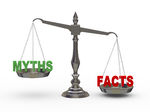There is a myth amongst those treating
and those receiving the treatment, that it is muscle tightnesses
that brings about recurrent low back or neck pain, and they need to
be stretched to bring about reduction of your
symptoms.
Lower extremities and hamstrings
and psoas tightness fail to predict future episodes of LBP
(Hellsing, 1988c; Nadler,
1998).
So why are we spending time and
money getting the muscles stretched regularly to avoid recurrences?
Have you ever thought, those in high performance sports who have
their muscles stretched and strong with regular exercises have also
been suffering from such easily reducible mechanical disorders.
Leg length differences as a cause for
back pain has been debated for the last three
decades.
It is estimated that about 90% of
the population has a leg length inequality with a mean of 5.2 mm.
This is however, not clinically significant (Lederman E 2008).
The comments on the radiographic report
on the presence or absence of lordosis
has been
linked to the cause of your symptoms.
The extent of lumbar lordosis as
well as the presence of scoliosis failed to show an
association with back pain (Dieck, 1985; Norton, 2004; Haefeli et
al., 2006; Christensen & Hartvigsen, 2008, syst.
rev.).
What does this mean? The lordosis
is variable with individuals. Radiographic documentation of the
reduction or increase in your lordosis does not mean it is the
cause of your symptoms. What we have to examine is, how does the
change in the lordosis affect your symptoms?
Scoliosis can also be aymptomatic.
What we need to assess is, has the scoliosis come with your back
pain and is it presently relevant to your symptoms, in the sense,
can we change the symptoms with changes to the spinal
scoliosis.
Back and neck pain is
genetic.
Some relationship between disc
degeneration and LBP it has been suggested that the genes that play
a part in the heritability of back pain also play a part in disc
degeneration, that is, pain may not be due to the mechanical
changes in the spine but to shared biological factors, linked to
variations in the collagen and immune-repair system/processes
between individuals (Battie et
al.,2007). But this is not conclusively proved.
Being overweight is the cause of all the
back and neck pain.
Overweight/obesity have a low
association with LBP (Leboeuf-Yde, 2000, syst.
rev.).
In
the sense, just ask yourself the question, does all overweight have
such back or neck problem as you?
A lot of strength programmes have to be
done to reduce your back pain and to prevent
recurrences?
A recent systematic review found
strong evidence that low trunk muscle endurance is not
associated with LBP (Hamberg-van Reenen, 2007, syst.
rev.). This review found inconclusive evidence for an
association between low trunk muscle strength and LBP. Also there
is no association between erector spinae pairs imbalances during
extension and LBP (Reeves et
al., 2006;Hamberg-van Reenen, 2007, syst. rev.; Van Nieuwenhuyse et
al., 2009).


